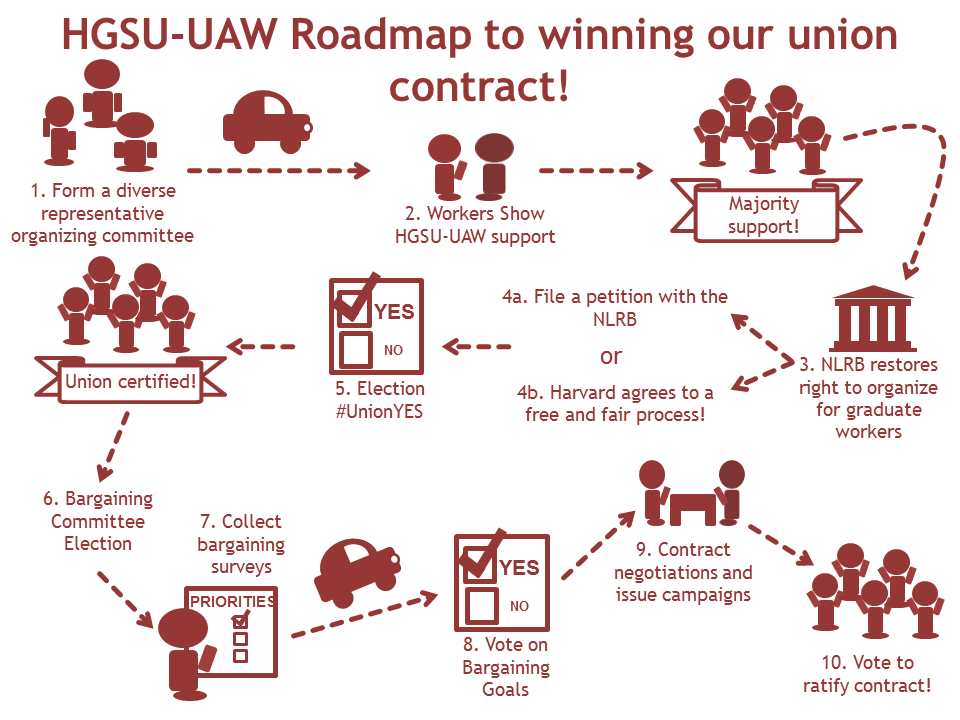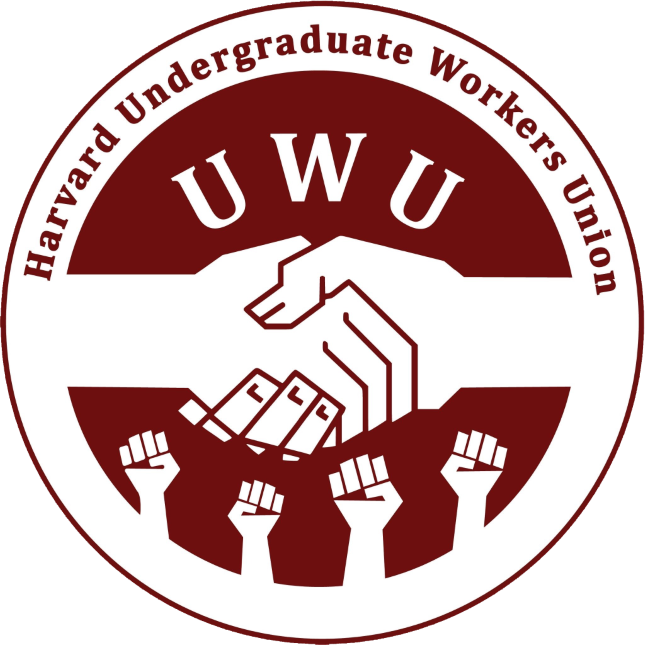Roadmap to a union contract

A union campaign trajectory can be described as follows:
1) Establish a representative organizing committee.
This is made up of leaders from every department who will help organize the union. Members of the organizing committee answer questions, get the word out, build support, and help make strategic decisions about forming our union. The names of many organizing committee members appear at the bottom of every HGSU-UAW authorization card.
2) Establish a supermajority of support.
To build support for the union, organizers collect signed union authorization cards from graduate workers across all Harvard campuses. These cards establish the level of support for the union. In addition, they provide a means of gathering up-to-date contact and work information from graduate workers who support the union. These cards are ultimately used in the NLRB certification process (see below).
3) The National Labor Relations Board (NLRB)
restored the right of graduate workers to collectively bargain a union contract with the Columbia and the New Schools decisions.
4a) Demand for recognition.
Once our supermajority is established, organizers approach the administration and demand they agree to a fair process for certifying our union. They are given the opportunity to do the right thing by recognizing our right to form a union by simply agreeing. Graduate workers took this approach at NYU in 2013, resulting in a 98.4% “Yes” vote in their union election.
4b) Petition the National Labor Relations Board (NLRB).
If the university administration is unwilling to agree to a fair process for establishing our union, organizers petition the National Labor Relations Board (NLRB), the federal agency responsible for certifying unions. Organizers deliver our signed authorization cards to the board, who will compare them to a list of eligible workers provided by the university. If a minimum proportion of workers have signed authorization cards, the board schedules an election.
4) The administration might fight workers’ right to form a union by filing various
Objections with the NLRB; if so, the board may hold hearings. These hearings can delay an election somewhat, but in general the rules governing NLRB hearings are designed to move to an election as quickly as possible.
5) Election.
All eligible workers cast a vote on unionization. If a majority of the graduate workers who vote do so in favor, the union is certified.
6) Election of Bargaining Committee.
Once the union is certified, workers elect a bargaining committee. This committee consists of graduate workers from Harvard, elected by the membership, who are willing to take on the substantial commitment of helping to negotiate our first contract Any worker who has signed a union authorization card is eligible to vote, and, and any graduate worker can sign a card at any time.
7) Collect Bargaining Surveys.
The bargaining committee circulates surveys among the membership which members can use to tell the committee what they want to see in a contract. This is an opportunity for all workers to describe the changes they would like to see in their working conditions and compensation, as well as to emphasize which current aspects of their work that they would like protected.
8) Vote to Accept Bargaining Goals.
Based on bargaining survey responses, the bargaining committee creates a list of bargaining goals, which are broad and all-encompassing. These goals must then be ratified by a vote of the membership.
9) Negotiate a contract.
With the priorities established in the bargaining survey, the committee bargain a contract with the administration.
10) Vote on Tentative Agreement.
The bargaining committee negotiates a draft contract, called a “tentative agreement,” with the administration. The membership then votes on the agreement. If they accept it, then workers have their first contract. If they choose to reject it, then the bargaining committee returns to the negotiating table.
10a) Union Dues.
Graduate workers do not pay dues until the first union contract.
11) Enforcement, Election of Officers, Establish Local Union.
Once the first contract in place, workers elect our officers and stewards, whose responsibility is to enforce our contract. Workers also vote on a set of bylaws which will determine how we govern our local and how we spend our dues.


